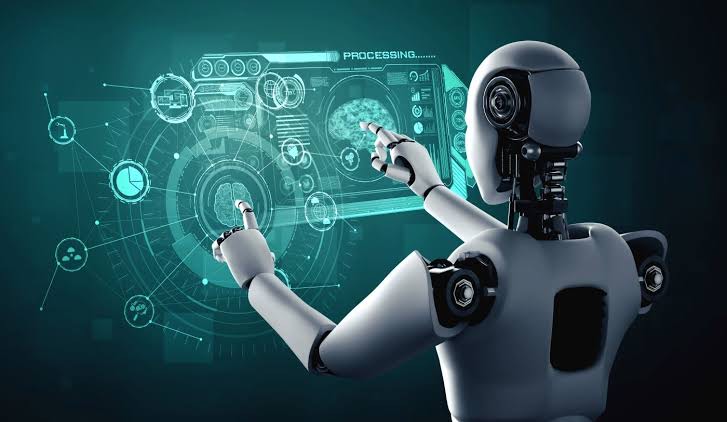Welcome to an exciting world where AI innovations are revolutionizing technology and society. Artificial intelligence, machine learning, and deep learning are reshaping the way we live, work, and interact. In this article, we will explore the transformative power of AI and its profound impact on various industries.
Artificial intelligence, commonly known as AI, refers to the development of computer systems that can perform tasks that typically require human intelligence. These systems analyze vast amounts of data, learn from patterns, and make intelligent decisions. The application of AI is widespread, ranging from voice assistants like Siri and Alexa to self-driving cars and personalized recommendations.
Machine learning, a subset of AI, focuses on teaching computers to learn from data and improve their performance over time. It enables systems to automatically recognize patterns, make predictions, and provide valuable insights. With the advent of machine learning, industries like healthcare, finance, and transportation are experiencing unprecedented advancements.
Deep learning takes AI even further by introducing neural networks that mimic the human brain. This branch of AI has revolutionized areas such as natural language processing, computer vision, and robotics. With deep learning algorithms, computers can process complex information, identify objects, understand written and spoken language, and even perform tasks with physical robots.
As AI advancements continue, numerous industries are being transformed. Robotics and automation are redefining manufacturing processes, logistics operations, and agriculture. With the implementation of AI technologies, these industries are seeing increased efficiency, reduced costs, and improved safety measures.
However, the impact of AI extends beyond industries. AI innovations shape our society, presenting both opportunities and challenges. From ethics and privacy concerns to job displacement and biases in algorithms, the societal implications of AI are vast. As we integrate AI into our daily lives, it is crucial to consider the responsible development and ethical use of this powerful technology.
In conclusion, AI innovations are driving unprecedented transformations in technology and society. Through artificial intelligence, machine learning, and deep learning, we are witnessing remarkable advancements across various sectors. As we move forward, it is important to harness the potential of AI while addressing the challenges it presents. Embracing responsible AI development will ensure a future where technology and society thrive harmoniously.
Key Takeaways:
- AI innovations, including artificial intelligence, machine learning, and deep learning, are reshaping technology and society.
- Machine learning enables computers to learn from data, recognize patterns, and make predictions.
- Deep learning, with its neural networks, has revolutionized natural language processing, computer vision, and robotics.
- Industries such as manufacturing, logistics, and agriculture are being revolutionized by AI through robotics and automation.
- The societal impact of AI includes ethical considerations, privacy concerns, job displacement, and algorithm biases.
The Rise of Artificial Intelligence
In recent years, artificial intelligence (AI) has rapidly emerged as a game-changer, revolutionizing various industries and driving technological advancements. This section explores the rise of AI and its profound impact on society and technology, with a focus on the role of automation.
AI, often referred to as “the next frontier of technology,” is transforming the way we live and work. With its ability to analyze large amounts of data, learn from patterns, and make intelligent decisions, AI is unlocking new possibilities across diverse fields.
One of the key breakthroughs in AI is automation. By harnessing AI technologies and algorithms, organizations can streamline processes, increase efficiency, and reduce costs in unprecedented ways. Automation powered by AI is reshaping industries such as healthcare, finance, and transportation, among others.
For instance, in the healthcare sector, AI is being utilized for advanced diagnostics, patient monitoring, and drug discovery. By leveraging machine learning capabilities, AI systems can analyze medical images, detect anomalies, and assist healthcare professionals in making accurate diagnoses faster. This not only improves patient outcomes but also enables more effective healthcare delivery.
In the financial industry, AI-powered automation is enhancing fraud detection, risk assessment, and algorithmic trading. AI algorithms can analyze vast volumes of financial data, identify patterns, and detect potential fraudulent activities with higher accuracy. Additionally, automated trading systems that utilize AI can process real-time market data and make data-driven investment decisions, increasing the efficiency of financial transactions.
Furthermore, AI-driven automation is reshaping the transportation sector, particularly with the development of autonomous vehicles. Self-driving cars, powered by AI technologies, have the potential to revolutionize transportation by enhancing safety, reducing traffic congestion, and improving overall efficiency. The integration of AI and automation in transportation holds the promise of a future where vehicles are seamlessly connected, communicating with each other and navigating through urban environments with minimal human intervention.
As AI continues to advance, its impact on technology, automation, and society will become increasingly significant. By leveraging AI capabilities, organizations can unlock new levels of efficiency, innovation, and growth. However, it is crucial to address the ethical considerations and potential risks associated with AI to ensure its responsible development and deployment.
In the next section, we will delve into machine learning and explore its role in analyzing vast amounts of data in various sectors.
Embracing Machine Learning
Machine learning is revolutionizing the way we analyze and make sense of vast amounts of data. In various sectors, machine learning algorithms are being leveraged to solve complex problems and enhance decision-making processes. By harnessing the power of this technology, organizations can gain valuable insights and drive innovation.
Unleashing the Potential of Data Analysis
Machine learning enables us to extract meaningful patterns and trends from data that would otherwise be overwhelming to analyze manually. By automating the process of data analysis, organizations can uncover hidden insights, make data-driven decisions, and optimize operations.
With advanced machine learning techniques, such as deep learning and natural language processing, we can decipher unstructured data like text, images, and videos. This opens up new possibilities for industries like healthcare, finance, marketing, and more.
Applications Across Diverse Sectors
The applications of machine learning are vast and diverse. Let’s explore a few examples:
- In healthcare, machine learning algorithms can analyze medical records, genetic data, and clinical trials to aid in disease diagnosis, drug discovery, and personalized treatment plans.
- In finance, machine learning can detect fraudulent transactions, predict market trends, and optimize investment strategies.
- In manufacturing, machine learning can optimize production processes, detect anomalies in equipment performance, and minimize downtime.
Driving Innovation and Transformation
Machine learning is not only transforming businesses but also pushing the boundaries of technology. By leveraging the power of algorithms, organizations can innovate and create new services, products, and experiences for their customers.
“Machine learning is enabling us to unlock the untapped potential of data and drive innovation across industries.” – Dr. Jane Johnson, Chief Data Scientist at Tech Innovations Inc.
As technology continues to evolve, machine learning will play an increasingly central role in shaping our future. It has the potential to revolutionize the way we live, work, and interact with technology.
| Industry | Applications of Machine Learning |
|---|---|
| Healthcare | – Disease diagnosis – Drug discovery – Personalized treatment plans |
| Finance | – Fraud detection – Market trend prediction – Investment optimization |
| Manufacturing | – Process optimization – Anomaly detection – Downtime minimization |
Deep Learning: Unleashing AI’s Potential
Deep learning, an intriguing subset of artificial intelligence (AI), is revolutionizing the technological landscape by emulating the intricate workings of the human brain. At the core of deep learning are neural networks, sophisticated algorithms that can process vast amounts of data and extract meaningful patterns, allowing machines to learn and make intelligent decisions.
This breakthrough in AI has paved the way for remarkable advancements in various fields. From natural language processing to computer vision and robotics, deep learning has unleashed the full potential of AI, enabling machines to understand and interact with the world in unprecedented ways.
One area where deep learning has made remarkable strides is natural language processing (NLP). By training neural networks on large datasets of text, machines can now not only understand human language but also generate coherent and contextually relevant responses. This has fueled the development of virtual assistants, automated customer service chatbots, and translation tools that facilitate communication across languages.
Computer vision is another domain where deep learning has transformed AI capabilities. Neural networks trained on vast image datasets can now recognize objects, interpret scenes, and even detect complex patterns. This has propelled advancements in fields like autonomous vehicles, facial recognition, and medical imaging, improving accuracy, efficiency, and overall performance.
Robotics is yet another area where deep learning plays a crucial role. By combining neural networks with sensory perception and motor control systems, robots can now navigate complex environments, perform delicate tasks, and interact with humans more intuitively. This has immense implications for industries such as manufacturing, healthcare, and logistics, where robots can enhance productivity and safety.
“Deep learning has revolutionized AI by enabling machines to acquire knowledge and make intelligent decisions, opening up a world of possibilities across various industries.”
– Dr. Andrew Ng, Co-founder of Coursera and an AI pioneer.
As deep learning continues to advance, we can expect even more groundbreaking applications in the future. From personalized medicine and predictive analytics to virtual reality and smart cities, deep learning will undoubtedly shape the AI-driven world we live in.
Applications of Deep Learning
| Domain | Applications |
|---|---|
| Natural Language Processing | Virtual assistants, automated chatbots, language translation |
| Computer Vision | Autonomous vehicles, facial recognition, medical imaging |
| Robotics | Industrial automation, healthcare assistance, collaborative robots |
Revolutionizing Industries with AI
In today’s fast-paced world, artificial intelligence (AI) is revolutionizing industries across the board. One area where AI is making a significant impact is in the integration of robotics and automation. By combining cutting-edge technology with advanced algorithms, businesses are unlocking new possibilities, streamlining operations, and improving efficiency in sectors such as manufacturing, logistics, and agriculture.
Robotics enables businesses to automate processes that were once labor-intensive, reducing costs and increasing productivity. AI-powered robots can perform repetitive tasks with precision and accuracy, eliminating human error and creating safer work environments. This not only improves overall efficiency but also allows human workers to focus on more strategic, creative, and value-added activities.
Moreover, AI-powered automation systems can analyze vast amounts of data in real-time, enabling businesses to make faster and more informed decisions. By leveraging machine learning algorithms and predictive analytics, companies can optimize supply chain management, inventory control, and product quality, leading to enhanced customer satisfaction and increased profitability.
The Benefits of AI-powered Robotics:
- Increased productivity and efficiency
- Improved accuracy and precision
- Reduced operational costs
- Enhanced workplace safety
- Optimized supply chain management
- Improved product quality and customer satisfaction
The Challenges and Future Implications:
While the potential benefits of AI-powered robotics and automation are vast, there are also challenges that need to be addressed. One major concern is the displacement of human workers. As robots take over certain tasks, there is a need to reskill and upskill the workforce to adapt to the changing job landscape.
Additionally, the integration of AI technology requires significant investment and expertise. Businesses must ensure they have the necessary infrastructure and skilled professionals to implement and maintain these systems effectively.
Looking ahead, the future implications of AI-powered robotics and automation are promising. With advancements in machine learning, natural language processing, and computer vision, robots are becoming more intelligent and capable of complex tasks. Industries such as healthcare, construction, and retail are already exploring the possibilities of AI-powered robots to further transform their operations.
| Industry | Application of AI-powered Robotics |
|---|---|
| Manufacturing | Assembly line automation, quality control |
| Logistics | Warehouse management, package sorting |
| Agriculture | Crop monitoring, harvesting, and maintenance |
AI in Society: Opportunities and Challenges
Artificial intelligence (AI) has the potential to revolutionize society by enhancing our capabilities, improving efficiency, and providing innovative solutions to complex problems. However, the widespread adoption of AI also presents various opportunities and challenges that need to be carefully considered.
Opportunities for Society
AI technologies offer numerous opportunities to improve society by transforming various industries and sectors. Let’s explore some of these key opportunities:
- Enhanced Healthcare: AI-powered technologies can assist in diagnosing diseases, analyzing medical images, and predicting treatment outcomes, leading to more accurate diagnoses and personalized treatments.
- Efficient Transportation: AI algorithms can optimize traffic flow, enhance autonomous driving, and contribute to the development of smart cities, reducing congestion, fuel consumption, and pollution.
- Improved Education: AI applications can personalize learning experiences, provide adaptive feedback, and enable remote education, making learning more accessible and tailored to individual students.
- Enhanced Safety and Security: AI-powered surveillance systems can detect and mitigate security threats, enhance border control, and improve public safety, contributing to a safer society.
Challenges for Society
While the opportunities presented by AI are promising, there are also significant challenges that need to be addressed. Here are some key challenges associated with the widespread adoption of AI:
- Ethical Considerations: AI raises complex ethical dilemmas related to privacy, bias, accountability, and job displacement. It is crucial to establish guidelines and regulations to ensure the responsible and ethical development and use of AI technologies.
- Social Impact: The rapid advancement of AI may disrupt job markets, leading to unemployment and socioeconomic disparities. Society must find ways to adapt, reskill, and manage the impact of AI on employment and societal structures.
- Transparency and Explainability: AI algorithms can be complex, making it challenging to understand and interpret their decision-making processes. Ensuring transparency and explainability is essential to build trust and address concerns about AI bias and discriminatory outcomes.
- Data Privacy and Security: The use of AI requires vast amounts of data, raising concerns about privacy and data security. Robust measures must be in place to protect individuals’ privacy and prevent unauthorized access or misuse of data.
“AI has the potential to powerfully assist humans in solving some of the world’s most pressing challenges. However, we must approach its adoption with caution, carefully considering the ethical and societal implications.” – Sundar Pichai, CEO of Google
It is crucial for society to embrace AI innovations while addressing the associated challenges. By adopting responsible AI development practices, ensuring transparency and ethics, and investing in education and adaptation, we can maximize the benefits and minimize the risks of AI, ultimately creating a society that thrives on the possibilities offered by this transformative technology.
Conclusion
Throughout this article, we have explored the transformative power of AI innovations and their profound impact on technology and society. From artificial intelligence and machine learning to deep learning, these advancements are reshaping industries and revolutionizing our daily lives.
AI is fueling automation and driving technological advancements, enabling breakthroughs in fields such as healthcare, finance, and transportation. Machine learning algorithms are analyzing vast amounts of data, improving decision-making processes, and solving complex problems across diverse sectors.
Deep learning, with its neural networks that mimic the human brain, is unleashing AI’s potential in areas like natural language processing, computer vision, and robotics. Industries such as manufacturing, logistics, and agriculture are being revolutionized through the integration of AI, leading to increased efficiency and productivity.
As AI continues to advance, it is important to acknowledge the opportunities and challenges it presents to our society. While offering immense potential for progress, ethical considerations surrounding responsible AI development and deployment must be addressed. The ongoing importance of AI in shaping technology and society cannot be underestimated, and we must embrace its future developments with careful consideration.
FAQ
What are AI innovations?
AI innovations refer to advancements in artificial intelligence technology that aim to improve and automate tasks traditionally performed by humans. These innovations encompass various fields such as machine learning, deep learning, natural language processing, robotics, and computer vision.
How is artificial intelligence transforming technology and society?
Artificial intelligence is transforming technology and society by enabling automation, improving decision-making processes, and revolutionizing various industries. It has the potential to enhance efficiency, productivity, and convenience, while also presenting challenges and ethical considerations.
What is the rise of artificial intelligence?
The rise of artificial intelligence refers to the increasing prominence and adoption of AI technology in various fields. It involves the integration of machine learning algorithms, automation systems, and advanced analytics to drive innovation and solve complex problems.
What is machine learning, and how does it relate to data analysis?
Machine learning is a subset of artificial intelligence that focuses on algorithms and models that learn from data to make predictions or decisions. It plays a crucial role in data analysis by analyzing and processing vast amounts of data to extract valuable insights, patterns, and trends.
What is deep learning, and how is it unleashing AI’s potential?
Deep learning is a subset of machine learning that mimics the functioning of the human brain through neural networks. It enables AI to understand and interpret complex data, leading to advancements in natural language processing, computer vision, robotics, and other AI applications.
How is AI revolutionizing industries through robotics and automation?
AI is revolutionizing industries such as manufacturing, logistics, and agriculture through the integration of robotics and automation. It enhances productivity, improves safety, and enables cost-effective operations by streamlining processes, reducing manual labor, and optimizing resource allocation.
What are the societal opportunities and challenges associated with AI?
The widespread adoption of AI presents vast opportunities for society, including improved healthcare, enhanced transportation systems, and optimized resource management. However, it also raises concerns about job displacement, ethical considerations, privacy, and bias in algorithmic decision-making.
What is the conclusion of AI’s transformative power in technology and society?
In conclusion, AI innovations are transforming technology and society by driving automation, improving decision-making processes, and revolutionizing various industries. The future holds immense potential for AI development, emphasizing the importance of responsible AI integration to mitigate risks and ensure ethical considerations are prioritized.










